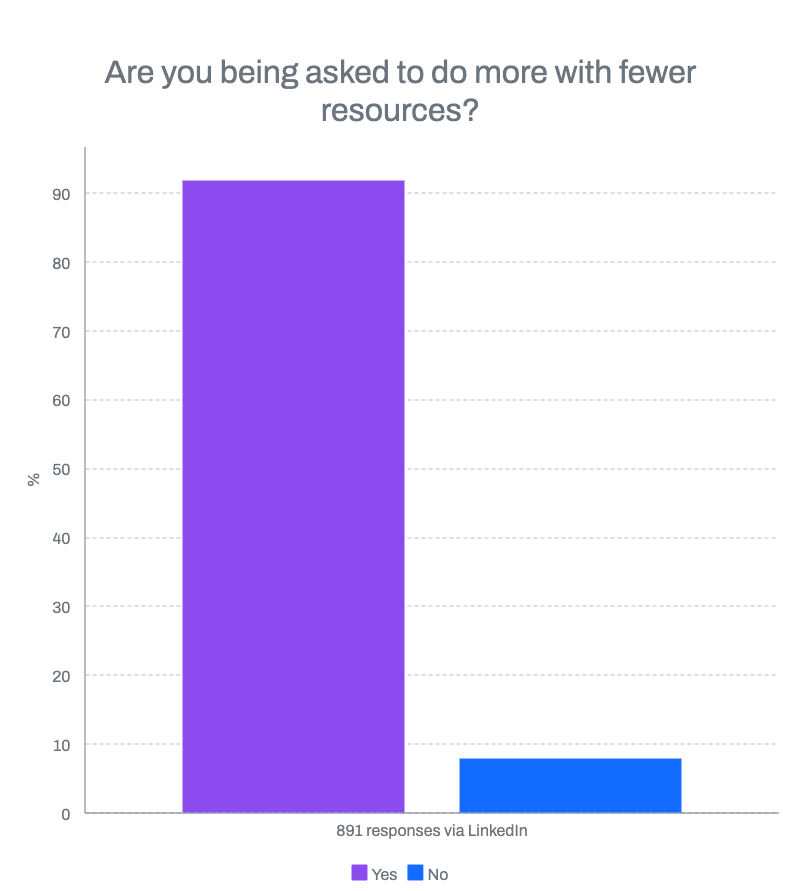What’s happening in the Product job market? We know there have been lots of layoffs, that there’s an oversupply of candidates and that there’s ongoing disruption from artificial intelligence, so what are job prospects currently like for product managers?
It’s a tough time to be looking for work, in product management or anywhere else in tech. The stats are sobering. So far this year, according to layoffs.fyi, 321 tech companies have laid off over 96,000 staff. That’s more than double the number of layoffs recorded in February, when we last reported on these stats. The reasons behind this huge number have been well explored by commentators and economists – briefly, a correction to overhiring during the pandemic, high inflation, weaker than expected demand, greater difficulty in raising capital. And let’s not forget that product management itself is prone to quickly forming an existential crisis with very little help from elsewhere – we can all remember the collective meltdown that followed Brian Chesky’s remarks that AirBNB would supposedly be getting rid of its product managers.
Chris Mason, CEO of recruiter Intelligent People, says it’s been a difficult 12 months. Vacancies levels are down for Product jobs at all levels, he says, and he’s inundated with applications every time he places a job ad: “Companies are still hiring, but there’s a massive oversupply of candidates.” Job seekers are having to make compromises across the board – remuneration, seniority, conditions, the whole lot – in order to keep working, he says.
Doing more with less
It’s common enough for companies to request a broader set of skills and experience in the candidates they seek to hire after a period of overhiring, says Richard Sadd, CEO of executive search firm Acquired Talent. “It means that the target candidate pool can be limited due to higher expectations, resulting in a very competitive market for job seekers,” he says.
It seems that life is also getting tougher for those still working in Product. We’ve conducted a couple of our own polls at Mind the Product in an effort to gauge our community’s sentiment about this. An overwhelming 92% of you report you are being asked to do more with fewer resources, while more than a third of you say your business has implemented a hiring freeze.

Chris Mason says lots of his clients are worried about their next liquidity point. “They make cuts, just to extend the runway,” he says. “They’re running really, really lean. They’re doing what they can to survive.” They’re being careful about what they invest in, and whereas once they could afford to be more experimental – maybe they had broader teams, ran pilots and built and tested lots of different products – now they’re safeguarding their core mission. For early career product managers looking for their first or even next product job, Chris’ advice is to “just try and get a job”. “That way you're going to learn something,” he says. “Don't think you're going to get your perfect role. You’ll learn something, learn about yourself and what you enjoy.”
Problems for more junior product managers
Much of the above points to trouble further down the food chain, and fewer jobs and on-the-job training available for product managers early in their careers. We’ve spoken to a few product leaders who voice concerns that AI disruption could also become a big issue for those entering the workplace. They point out that while each individual should become more productive when they're using AI, many of the product tasks that use AI would formerly have been given to junior employees to help them learn their craft. They say the opportunities for junior product people are becoming fewer and we could well end up with a gulf between those leaving education and the bar for employment.
The balance between using AI to enhance productivity and keeping opportunities open enough to encourage young people into Product jobs feels like it will be tricky to get right. There’s already a fair bit of research that demonstrates the upsides to the adoption of AI tools in product. This report from McKinsey, How generative AI could accelerate software product time to market, highlights how a sample of 40 product managers are already using generative AI to improve their productivity, with the report saying that “PMs with more years of experience maintained a high quality of output, whereas more junior PMs gained productivity but at the expense of quality”. The report concludes: “Our hypothesis is that senior PMs, given their familiarity with the deliverables and their stronger product sense, can better review the gen AI tools’ output and ensure high accuracy and writing fluency. More junior PMs, conversely, are still learning how to produce high-quality deliverables and cannot yet effectively review gen AI outputs. Clearly, gen AI cannot replace the foundational skills needed to be a PM, but it can help PMs develop those skills.”
AI at work is here
Similarly this year’s Microsoft and LinkedIn annual Work Trend Index, called AI at Work Is Here. Now Comes the Hard Part, finds that 75% of workers are already using AI at work, with 46% of them having started to use it within the last six months. Nearly 80% of these workers – across all age groups – are bringing their own AI tools to work. The report finds that people are overwhelmed with digital debt and under duress at work and are turning to AI for relief. Tellingly, the report finds that two-thirds of leaders say they wouldn’t hire someone without AI skills, and 71% of leaders say they’d rather hire a less experienced candidate with AI skills than a more experienced candidate without them. What’s more, 77% of leaders say that with AI, early-in-career talent will be given greater responsibilities.
As Stuart Winter-Tear, Head of Product at startup Genaios says, it seems that the obsession with AI has come to the point where people would rather hire somebody with AI skills, even if they have fewer of the traditional skills necessary for the job. Many product management tasks can be automated, he says, “we can even do market research through AI, I’ve done it, it's been fantastic. And we can even use synthetic users so you can define the persona you want to ask about your product idea.” But there’s much that cannot be automated, says Stuart, and these are the things that product managers will have to specialise in now.” He adds: “Product is not just about one thing. It's about understanding the context and business situation. It's about understanding trade offs and your particular constraints and threats. And AI is not really able to do this, it can do this in a very sandboxed way.”
Critical thinking to the fore
It means critical thinking should become of utmost importance to product managers, he says. Product managers need to be facilitators and translators, becoming the glue between research and engineering and the rest of the business. “If we’re looking for Product to keep its relevance in a rapidly changing environment, then this is how it needs to position itself,” Stuart says.
If this is scant comfort to an early career product manager looking for their next role, then there’s more food for thought. Randeep Sidhu, an interim CPO and board member of the NHS Business Services Authority, points out that the big shift to remote working since the pandemic does those more junior employees a disservice. “They’re missing out on the casual mentoring and passive learning that we used to get by being in an office,” he says. Not only that, they’re more likely to miss out on the early network building that we all rely on throughout our careers and opportunities to improve on weaker soft skills that get shown up more quickly in an office environment.
A happy ending
But we should close with a success story. In February we spoke to Katelin Wall, after she unexpectedly found herself looking for a new job. She’s a product manager with a couple of years solid experience in education and ed tech. Happily, after a lot of effort, she’s found what she was looking for and recently started working for Bentley Systems.
Her job-seeking stats are both sobering and enlightening. She was actively looking for work for 14 weeks, during which time she applied for 127 jobs. She went through an interview process with nine companies (removing herself early from four of them) and ended up with two job offers. Job hunting was a full time job, she says, and for many potential roles she would only see whether there was a culture fit or a skills fit after she had applied. The people in her network who shared their advice and helped her to build connections were her heroes, she says, and the temporary consulting work she found while looking for something permanent was invaluable.
What are your experiences of looking for work as a product manager, and what steps have you taken to improve your skills and improve your chances of finding a new job? Please let us know.







